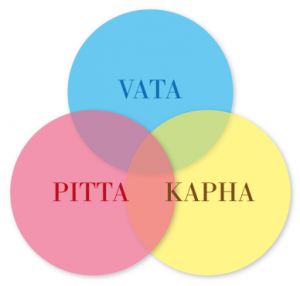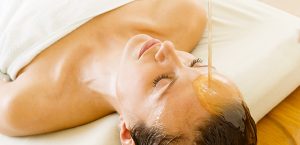Everyone has had them at one time or another: headaches. 5 September is Headache Day in Germany – which should be of interest to at least 60% of all people. Because that is the percentage of people who suffer at least temporarily from pressure, throbbing, piercing, or stabbing pain in the head.
Many kinds of headache
According to the International Headache Society (IHS) there are at least 176 different types of headache. One well-known headache medication mentions 37 types of headache that one can treat oneself. Classic painkillers are widespread and can be found in almost every household. However, they should not be used too often, as frequent use of painkillers can also cause headache. There is an increased risk if you take painkillers for headaches on at least 10 days per month for more than 3 months.
In Maharishi AyurVeda there are as many types of headache as there are patients. Because no two patients are alike, no two underlying causes are exactly the same. In the classical scriptures, headaches are summarized under Shiroroga.
Imbalance is the cause
Surely you are aware that the three Doshas – Vata, Pitta and Kapha – determine your life energy and well-being. When they are in balance, you are healthy, full of energy and inner joy. In normal life, it is natural and practically inevitable that imbalances of the three Doshas arise time and again. Simultaneously, Ama is created – undigested metabolic residues. Further, we absorb environmental toxins with our diet.
Ultimately, all factors that influence the Doshas can lead to headaches. The most common triggers are lack of exercise, an unfavorable diet, digestive disorders, infections and changes in the area of the paranasal sinuses, excessive exposure to heat, sun, cold, or rapidly changing weather conditions, and particularly over-stimulated sensory organs. But also emotional factors such as fear, anger, rage, a tendency to brood and worries can cause afflictions of the head.
In the Madhava-Nidanam, the cause is described as follows: “Painful conditions of the head are caused by Vata, Pitta, Kapha individually or in combination, by Rakta, Dhatukshaya, Krimi and also by diseases like Surya-avarta, Anantavata, Ardhavabheda and Shankhaka.”
Translated: an imbalance of one or more Doshas and/ or body tissues, especially the blood, promotes the development of various headaches. The cause has been clearly described in the ancient Vedic texts for thousands of years and gives helpful pointers for the individual therapy of affected persons.
Headaches and the Doshas
Vata-type headaches
This term is used to describe headaches caused by a disturbance of Vata Dosha. Usually, the pain comes up by itself, without any foreshadowing. Patients often describe a tugging, rising up at the back of the head. The character of the pain can be described as very strong and stabbing and can increase even more during the night. Oftentimes this affects the mood, with an increase in worry and anxiety.
Resting, warmth, massages, regular bowel movements, and a regular daily routine have been shown to be helpful. But exposure to cold, lack of sleep, stress, food that is cold and very dry can trigger this type of headache.
Pitta-type headaches
This type of headache can be attributed to excessive Pitta and usually starts in the middle of the head. The head feels hot and overheated, the pain is felt as a burning and pulling sensation.
Aggravating factors are too much exercise, with rising heat, pressure on the head (e.g. from a stooping position) and also emotions such as anger and resentment. The pain can be accompanied by reddened eyes, sensitivity to light and noise, even nausea and vomiting. Anything that removes the excessive heat from the head and calms Pitta Dosha has an alleviating effect. We had collected practical tips and guidelines for this in our August newsletter.
Kapha-type headaches
This type of headache is more characterized by a dull pain or pressure, often localized in the forehead area and is associated with increased Kapha Dosha. The pain intensifies when the head is bent down and can be accompanied by swellings around the eye area. Patients feel lethargic and tired.
It is exacerbated by heavy, fatty food, too little exercise, damp and cold, and overly long sleep in the morning. Correspondingly, pain-relieving factors are easily digestible food, gentle exercise, activity, and warmth.
12 Ayurvedic tips for dealing with headaches
- Tension headaches always arise on the basis of a Vata disturbance. To restore Vata Dosha to its natural balance, regularity is of vital importance. Make sure to sleep enough and go to bed early, so that you wake up before the alarm clock rings. Most importantly: sleep at the same time every day.
- As possible, all meals should be warm, sweetish, nutritious, and easily digestible – and above all: at regular times!
- Take a snack only when you feel really hungry; don’t eat animal protein in the evening.
- Try to reduce alcohol, nicotine, coffee and black tea to a minimum or avoid them altogether.
- Take enough breaks. If you have sedentary work, set a timer on your desk to get up every 60 minutes and do a few gymnastics or yoga exercises to get out of the rut and to compensate for the congested Vata caused by sitting down.
- Take at least one walk of 20 to 30 minutes daily and regularly. Do not overexert yourself, but walk briskly.
- Do you know Vata massage oil? Especially when you are on the road a lot, Vata oil applied externally is ideal for calming the nervous system and counterbalancing excess Vata.
- Gently massaging the temples and neck muscles with Vata oil can relax and relieve, particularly in the case of tension headaches. After that, you can place a warm and moist towel on the massaged area to pacify and to remove Ama from the neck area.
- When you have a headache, the forehead and temple muscles often tense up because of excessive mental labor. Lie down comfortably with your head slightly elevated and enjoy the comforting effect of Ayurvedic herbal oil with mint or the Maharishi Ayurveda Balm, covered by a warm, moist cloth. Incidentally, a study has shown that peppermint oil is just as effective in relieving pain as aspirin.
- Have you heard of Maharishi Gandharva Veda? This classical Ayurvedic music is popular with people suffering from headaches and migraines because of the wonderful effect it can bring. Its balancing melodies can restart the energy flow and help alleviate pain. In addition, Maharishi Gandharva Veda stimulates the physiology’s inner intelligence, can slow down the growth of cancer cells, and harmonizes mind and body. In tension conditions we recommend listening to the soothing rain melody.
- Migraine is not just caused by a Vata disorder, it is mainly Pitta Dosha that is out of balance. Nevertheless, everything you do to pacify Vata Dosha at least helps to reduce the frequency and intensity. Pitta tea, Pitta Churna and Pitta oil can reduce the discomfort. But for treating real migraine, it is necessary to have an experienced Ayurveda specialist prescribe additional herbal preparations, individually selected for you.
- One of the most reliable remedies for headaches and migraines is daily practice of Transcendental Meditation™. We regularly offer a basic course to learn this easy technique in our Health Centre. (For more information, have a look at this website, where you can also click “Choose country” at the top.) Did you know that e.g. Gwyneth Paltrow, Nicole Kidman, and Clint Eastwood all practice Transcendental Meditation daily? And in a comparative study, it was found that a group of managers practicing TM suffered significantly less from stress-related headaches than the control group.
Panchakarma – the royal road to say goodbye to headaches
The most common types of headache are tension headache and migraine and both have similar causes: stress factors in combination with Ama (metabolic residues). A pulse diagnosis can give you more precise information about the cause of your ailment. During an Ayurveda consultation, the doctor will also explain what you can do yourself for relief. You can choose for treatment on an outpatient basis or as part of a Panchakarma cure. By dissolving, mobilizing, and eliminating Ama and toxins, a significant reduction in pain is achieved and you regain your quality of life.
Our doctors will tailor your Panchakarma course of treatment exactly to your own specific Dosha constitution and your condition. In Ayurveda, every person is considered unique, therefore your individual Ayurvedic therapy is also unique. Our experience of more than 30 years has shown again and again that a Panchakarma cure brings about positive changes and relieves headaches in many people.
For all your questions and needs, our Reception team will be happy to assist you.: +49 2603-9407-0 or have a look at our English website.
Download this article as a PDF file
© Maharishi AyurVeda Privatklinik Bad Ems

